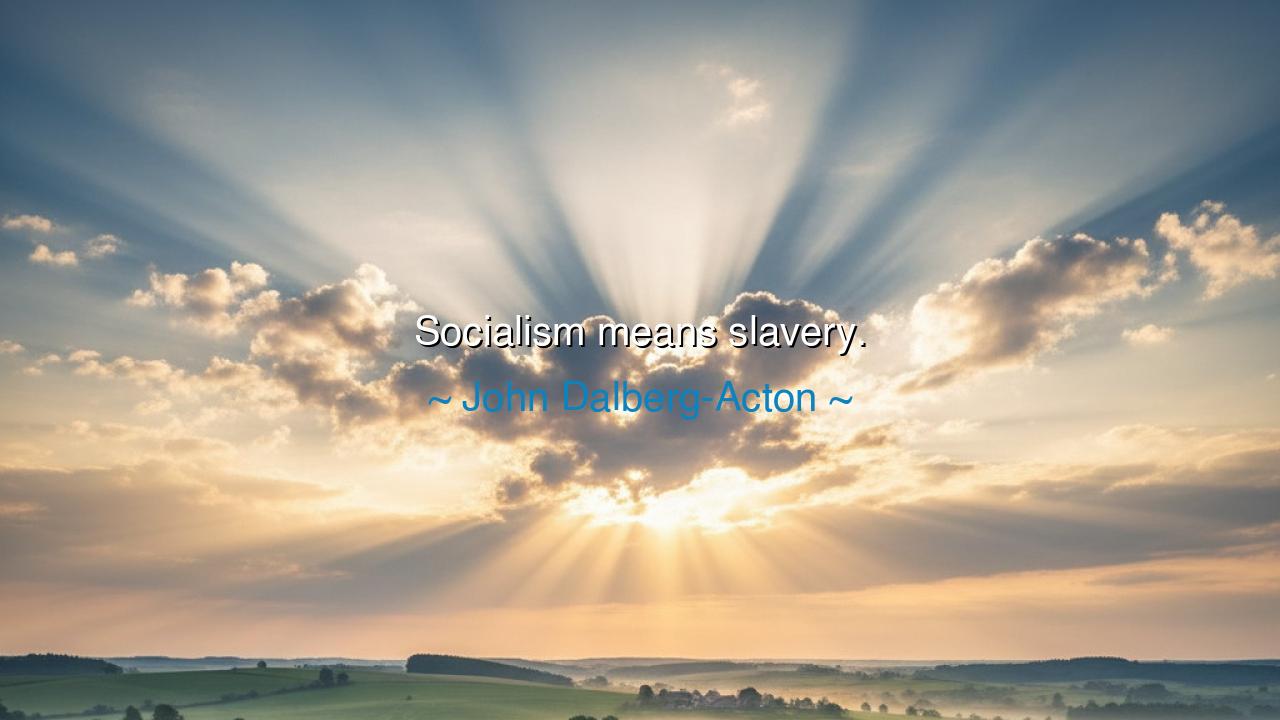
Socialism means slavery.






In the solemn twilight of the nineteenth century, when the world was trembling between the old order of kings and the new power of the masses, the historian and philosopher John Dalberg-Acton, better known as Lord Acton, spoke with the authority of conscience and the clarity of reason: “Socialism means slavery.” These words, brief yet thunderous, were not born from hatred of equality nor from the defense of privilege, but from a deep understanding of human nature and the corrupting tendency of power. Acton, whose famous maxim “Power tends to corrupt, and absolute power corrupts absolutely” had already become immortal, warned that the collective promises of socialism conceal a dangerous truth — that when the state takes command of all, the individual becomes a servant of authority rather than a master of himself.
The origin of this quote rests in Acton’s lifelong study of liberty and history. He lived in an age of revolutions, when socialism, rising from the turmoil of industrialization, promised to end poverty and oppression by placing the means of production in the hands of the state. To many, it seemed a vision of justice and fraternity. But Acton saw farther. He understood that in the pursuit of equality through government control, freedom itself is sacrificed. For if the state becomes the owner of all property and the provider of all needs, it must also become the judge of all actions. Thus, under the banner of collective good, the individual’s will is subdued, his labor commanded, his choices dictated — and in this submission, Acton saw not progress, but slavery.
He spoke not from theory alone, but from the testimony of history. The ancient empires had known this bondage well. In Sparta, the citizen was raised from birth not for himself, but for the state. His life belonged to the collective — his body to the army, his mind to the law, his freedom to the will of his rulers. Order was perfect, but the soul was shackled. Rome, too, in its imperial years, enslaved the very citizens it sought to protect, demanding obedience in exchange for bread and games. The people, fed by the hand of the emperor, forgot the dignity of self-reliance and bowed before the power that sustained them. To Acton, socialism, in its modern guise, was but the same ancient pattern wearing a new mask — the state as master, the people as subjects.
Yet his warning was not a rejection of compassion or community. Acton did not deny that society bears responsibility toward the poor, the weak, and the suffering. But he believed that true charity and true justice arise from voluntary goodness, not from forced redistribution. When generosity is commanded by law, it ceases to be virtue and becomes submission. The man who gives by compulsion is not noble; he is obedient. Thus, in Acton’s eyes, socialism, though clothed in the rhetoric of brotherhood, destroys the moral root of freedom — the right to act from one’s own conscience. To make the state the arbiter of all wealth and welfare is to strip man of his moral independence, and without that independence, liberty becomes a hollow word.
Consider the lessons of the twentieth century, when nations sought to build utopias through the iron hand of the state. In Soviet Russia, socialism promised equality, but delivered tyranny. The workers, in whose name the revolution had been fought, found themselves ruled by a new aristocracy — a bureaucracy of power that claimed to speak for the people, yet silenced their voices. Farms were collectivized, dissent was punished, and millions perished in the name of progress. The state had become all, and the people had become nothing. The prophecy of Lord Acton was fulfilled: where freedom is surrendered to the collective, slavery takes root beneath the banner of equality.
Yet his words are not meant to harden the heart, but to awaken the spirit. For Acton’s vision of liberty is not selfishness, but sacred responsibility — the belief that each soul must be free to choose, to create, to fail, and to rise again without the chains of coercion. He taught that the moral strength of a society depends not on the commands of its government, but on the conscience of its people. Freedom, he said, is not the gift of the state, but the birthright of every human being — and the state’s first duty is not to govern all things, but to leave men free to govern themselves.
The lesson, then, is eternal: beware of any system that promises heaven on earth at the price of your freedom. The road to tyranny is paved with benevolent intentions. Compassion must never be replaced by compulsion; justice must never be confused with uniformity. Let the people build communities of mutual aid, but let them do so by choice, not decree. For the greatness of a nation is measured not by the power of its government, but by the freedom of its citizens — the freedom to think, to labor, to believe, and to live as they see fit.
So remember, my children of the future, the wisdom of Lord Acton: “Socialism means slavery.” It is a warning carved into the stone of history — that when the state becomes your provider, it also becomes your master. Guard your liberty as the most sacred trust. Share with your neighbor, but never surrender your soul to the hand that commands in the name of compassion. For the true measure of civilization is not the power of its rulers, but the freedom of its people — and freedom, once lost, is the hardest treasure to reclaim.






AAdministratorAdministrator
Welcome, honored guests. Please leave a comment, we will respond soon